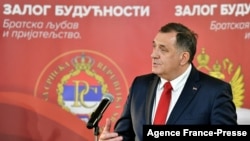The United States on Wednesday announced sanctions on Bosnian Serb leader Milorad Dodik and current and former officials, adding pressure against their secessionist efforts threatening Bosnia-Herzegovina's fragile union.
In its statement, the U.S. Treasury Department accused Dodik of corruption and threatening Bosnia-Herzegovina's stability and territorial integrity.
"Milorad Dodik's destabilizing corrupt activities and attempts to dismantle the Dayton Peace Accords, motivated by his own self-interest, threaten the stability of Bosnia and Herzegovina and the entire region," said Brian Nelson, undersecretary of the Treasury for terrorism and financial intelligence, who was quoted in the statement.
The department also imposed sanctions on Banja Luka-based media outlet Alternativna Television (ATV), which it accused Dodik of acquiring to push his political agenda.
According to Reuters, ATV criticized the sanctions as an attack on media freedom and democracy itself. Its management also denied allegations it was connected to Dodik.
"We are surprised with such a decision and regard as extremely trivial that a great state should take individual insinuations about ties between our media house and politicians as credible sources," ATV said in a statement to Reuters.
Following the sanctions, Dodik's and ATV's U.S. assets were frozen, and Americans are barred from dealing with them.
Two leaders barred
In addition to these sanctions, the U.S. State Department also banned two Bosnia-Herzegovina leaders from entering the U.S.: Milan Tegeltija, a former president of the high judicial council, and Mirsad Kukic, a lawmaker and president of the Movement for Democratic Action.
On Twitter, Tegeltija called the sanctions a "result of the politics which contains a brutal political pressure." Because the sanctions are not the result of court proceedings, he does not need to defend himself, he said.
Dodik, who serves as the Serb member of Bosnia's tripartite interethnic presidency, is a known secessionist and has become increasingly outspoken and active concerning his political goals.
He wants to reverse postwar reforms and return to the 1995 constitution.
Dodik has also increasingly followed through on succession threats of the Republika Srpska, the Bosnian Serb entity created under the U.S.-brokered Dayton Accords that ended the former Yugoslav republic's bloody war.
Referring to united Bosnia as a failure, Dodik acted to withdraw Bosnian Serb institutions, including the army, judiciary and tax system, from central authority last month.
Dodik has made it clear the U.S. sanctions will not stop him, telling a local media outlet that "if they think that they will discipline me like this, they are grossly mistaken."
No stranger to sanctions, such as those imposed in the final days of former President Barack Obama's presidency blocking his American holdings, Dodik has ignored U.S. pressure. After announcing his secessionist measures last month, he said he was not afraid of the sanctions that might result from his actions.
'Nothing serious'
Following a September 30 telephone call with U.S. envoy Gabriel Escobar, Dodik said, "It is absolutely inappropriate to threaten me with sanctions from his country. I'm already under sanctions and nothing serious has happened to me."
The sanctions reflected the United States' increased worry about the future of Bosnia's peace accords, especially after Dodik's recent attempts to unravel them. In addition to his secessionist measures, Dodik met last month with Russian President Vladimir Putin, who reportedly appeared to support his actions.
Christian Schmidt, the U.N. high representative for Bosnia-Herzegovina, said these sanctions were reasonable considering Dodik's actions. Schmidt called them "a logical consequence of the destructive and dangerous attitude in reference to his failure to meet the basic requirements of responsible leadership."
The Dayton Accords ended a brutal war in which 100,000 people died and 2 million were driven from their homes. In the war's aftermath, Bosnian Serb forces were accused of genocide.
The peace accords divided the country into two halves: one for the Bosnian Serbs and one for a Muslim federation.
Presently, Bosnia has experienced its most serious political turmoil since the war's end, reigniting fears that it could again split.
Following the announcement of the U.S. sanctions, Secretary of State Antony Blinken warned that further action was not out of the question, saying in a separate statement that "other leaders and entities linked to corrupt or destabilizing actors may also be subject to future actions by the U.S. government."
Some information for this report came from Reuters and Agence France-Presse.






